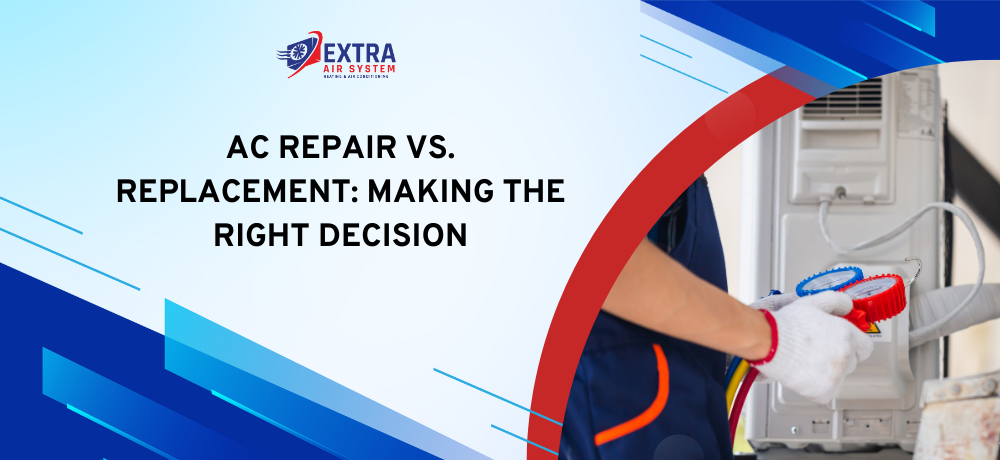AC Repair vs. Replacement: Making the Right Decision

As the scorching summer sun beats down on us, our trusty air conditioners become our steadfast companions in the battle against the sweltering heat. But what happens when our cooling allies start to falter, leaving us in a sweat-inducing predicament? Do we rush to repair the old faithful system, or is it finally time to bid adieu and welcome a shiny, new AC unit into our homes?
The decision to repair or replace your air conditioner is one that many homeowners grapple with, and it's not to be taken lightly. It's a choice that can have significant financial implications, affect your home's comfort, and even impact your environmental footprint. To make the right decision, you need to consider many factors, from the age and condition of your current AC system to your budget and long-term sustainability goals.
In this blog, we will delve deep into the world of air conditioning, equipping you with the knowledge and insights needed to navigate this pivotal crossroads. We'll explore the signs that signal your AC is in distress, the advantages and disadvantages of repairing versus replacing, and the environmental considerations that should be on your radar.
AC Repair vs. Replacement: Age as the Deciding Factor
When it comes to determining whether it's time to replace or repair your air conditioning unit, one of the primary factors to consider is the age of the system. Air conditioners typically have a lifespan of around 10 to 15 years. As your AC unit approaches the upper end of this range, it tends to become less efficient and more prone to breakdowns. This is because the system's internal components can wear out over time, and finding replacement parts may become increasingly challenging.
If your AC unit is nearing or has exceeded its expected lifespan and requires frequent repairs, it may be more cost-effective in the long run to replace it with a newer, energy-efficient model. Newer units are designed with the latest technology, ensuring better cooling performance and incorporating advanced features to enhance your comfort and energy savings.
AC Repair Costs vs. AC Replacement Investment
The cost of the necessary repairs is another crucial consideration. Minor repairs on a relatively new AC unit might make economic sense, as they can extend the system's life and keep it running efficiently. However, if the repairs are extensive and come with a hefty price tag, weighing the repair costs against the benefits is essential.
Consider the total cost of ownership over the next few years. Frequent repairs can quickly add up, and you may spend more money on keeping an old unit running than investing in a new one. In this case, replacing your AC unit might be more financially responsible.
Energy Efficiency in AC Repair vs. AC Replacement
Energy efficiency is a significant factor in the decision-making process. Older air conditioning units tend to be less energy-efficient, consuming more electricity to cool your home. This results in higher monthly utility bills. On the other hand, newer AC models are designed to meet stringent energy efficiency standards, meaning they use less energy to provide the same level of cooling.
Before making a decision, calculate the potential energy savings of a new unit compared to maintaining your current one. Over time, the reduced energy consumption of a new, energy-efficient AC unit can lead to substantial savings on your utility bills, offsetting the initial investment.
Frequent AC Breakdowns: Repair or Replace Dilemma
The frequency of breakdowns is a significant source of frustration and expense. If your AC unit constantly requires repairs and leaves you sweating in discomfort due to frequent malfunctions, it's a clear sign that it might be time for a replacement. Continual repairs strain your finances and disrupt your comfort and peace of mind.
AC Replacement for a Greener Tomorrow: Environmental Impact
In today's environmentally conscious world, the environmental impact of your decision matters. Older AC units may use refrigerants that are harmful to the environment, such as R-22 (Freon), which is being phased out due to its detrimental effects on the ozone layer. Replacing an older unit with a more eco-friendly and energy-efficient one can reduce your carbon footprint and contribute to a greener future.
Determining whether to repair or replace your air conditioning system is significant. When determining whether to replace or repair your air conditioning unit, it is crucial to evaluate factors such as its age, repair costs, energy efficiency, breakdown frequency, and environmental impact.
If your AC unit is approaching the end of its lifespan, demanding costly repairs, lacking energy efficiency, and experiencing frequent breakdowns, replacing it with a newer, more efficient model is often the prudent choice. This investment promises improved cooling performance, energy savings, and a positive contribution to both sustainability and home comfort.
Extra Air System is here to help you make an informed choice that suits your needs and budget. Trust our expertise to ensure you enjoy cool, efficient, and cost-effective cooling solutions. Reach out to Extra Air System today to discuss your AC concerns.
To learn more about the services we offer, please click here. To contact us, please click here or call us at (905)875-4749.